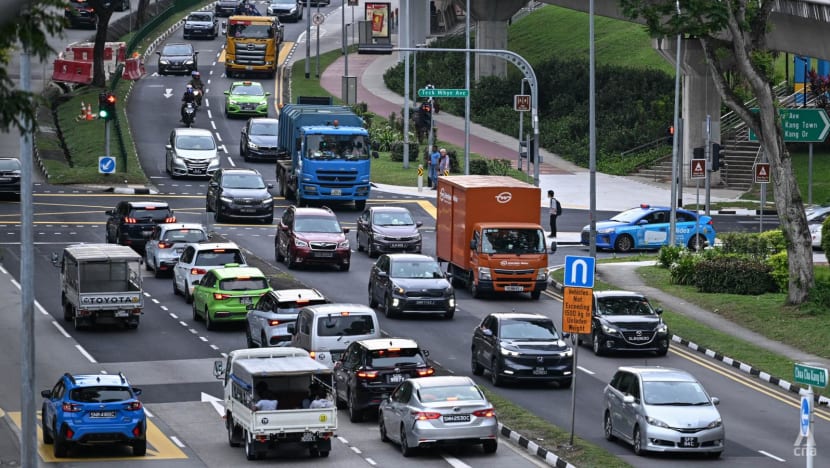WP's proposal for needs-based COE system is subjective and divisive: Jeffrey Siow
Among Workers’ Party MP Jamus Lim’s proposals were COE discounts for parents of more than one child under 14.

A view of traffic in Singapore. (File photo: CNA/Lan Yu)

This audio is generated by an AI tool.
SINGAPORE: A needs-based system for the Certificate of Entitlement (COE) sounds attractive, but in practice is subjective, divisive and benefits too few, said Acting Transport Minister Jeffrey Siow.
He was responding to a proposal of a new COE system by Associate Professor Jamus Lim (WP-Sengkang) in parliament on Monday (Sep 22).
The opposition Member of Parliament suggested in an adjournment motion a discounts-based system targeted at those who “benefit disproportionately from private car ownership”, such as parents of multiple young children and caregivers to elderly parents.
“Their need for private transportation is more acute than that of the average citizen,” said Assoc Prof Lim. “They would, accordingly, benefit from financial support that would make a car more accessible to them.”
In July, Assoc Prof Lim wrote on Facebook that the COE system does not consider how those with genuine needs for a car may not be able to afford one.
His post was a response to a speech by Senior Minister Lee Hsien Loong. Mr Lee subsequently commented on the post, saying that Singapore's government has ensured that everyone has access to affordable and efficient transport options without needing to own a car, rather than complicating the COE system.
WP’S PROPOSALS
Assoc Prof Lim proposed a “cleaner approach” in addressing the needs of certain groups, by applying discounts on their COEs.
For parents of two or more children, of which at least two must be below 14 years old, he proposed a 10 per cent discount for each additional child beyond the first.
This means a family of 2 children aged 4 and 7 would receive a 10 percent discount, while one with 3 children aged between 2 and 13 would receive a 20 percent discount. A family with a 5 and 15 year old would not receive any discount, nor would single-child families.
He also proposed that primary caregivers living in the same household with either both parents aged 80 and above or one parent with a chronic illness requiring regular medical check-ups, be entitled to a 10 per cent COE discount.
He noted that for the disabled, financial support in attaining a COE is already in place - Disabled Persons Scheme, that grants a full waiver of COE for eligible disabled persons.
He proposed that the discounts apply at the time of purchase, and that if the vehicle is subsequently sold, that the benefits would only remain with the family that qualified for the discount.
“The much smaller segment of the potential buyers which would qualify for such discounts makes it unlikely that they will materially move markets,” he said.
To keep the scheme fair and financially sustainable, means testing can be used, Assoc Prof Lim added.
For instance, the discount can be offered only to families below the median income, or excluding the top 20 per cent of earners.
NEEDS-BASED ALLOCATION CHALLENGING: SIOW
Mr Siow said that, other than Assoc Prof Lim, other Singaporeans have also shared similar perspectives with him, suggesting groups that can be treated specially or subsidised for car ownership.
“I sympathise with many of these perspectives,” he said.
He said that, in particular, for families with young children, or those sending elderly parents to medical appointments, it is not easy to navigate public transport with several young kids in tow, or with a senior in a wheelchair.
“I do not doubt that these families would benefit from a car,” he said.
However, it is challenging for the government to allocate COEs based on needs, said Mr Siow.
“What appears deserving to one person might not appear fair to another,” he said.
For instance, questions such as how many children and how old the children must be to qualify for benefits will be raised.
“Or if we allocate based on income, we have to decide whether to do household income, or personal income; or whether big households should be more deserving than small families” he said.
There are also practical considerations, said Mr Siow, such as whether to take away the car when the need is gone.
“All these ideas sound very attractive, but no matter how one draws the line, there will always be people who fall on the wrong side of the line, who believe they are more deserving,” he said.
“And we will still be here, at another parliament sitting, debating at this late hour, how each line has been drawn.”
COE REVENUES BENEFIT WIDER PUBLIC: SIOW
It is ultimately difficult to make a case for COE subsidies for some families, said Mr Siow.
Rather than give one family a substantial COE subsidy, the same amount of subsidy can be redistributed to benefit many more families, including those who do not want to or are not able to have a car, he said.
“For example, we can give many more families credits to be used for transport services, as we have done with the Large Families Scheme, or to defray other expenditures, through cash or with vouchers,” he said.
He acknowledged that COE prices have risen over the recent months, with more potential car buyers feeling priced out.
Earlier this month, Category A COE prices hit a record S$119,003 (US$93,171).
The government has sought to stabilise supply by bringing forward future quotas and injecting up to 20,000 COEs. But cheaper Chinese-made electric vehicles entering the market have added pressure on bids.
Ultimately, Mr Siow said, the priority is to expand connectivity for all Singaporeans through investments in public transport.
For instance, S$2 billion is spent on operational subsidies to keep bus and train services running each year.
The COE system needs to be seen in a wider context, Mr Siow said.
“A needs-based system for the COE sounds attractive, but in practice it is subjective, divisive, and benefits too few,” he said.
He added that the market mechanism is transparent and allows the government to channel COE revenues to benefit the wider public.
The revenues, which amount to about S$4 billion to S$6 billion a year on average, go towards subsidising public transport, as well as other government expenditures on healthcare, education, and defence, said Mr Siow.
“This is not a perfect system, but it is the fairest and most effective way to allocate a scarce resource in Singapore’s context,” he said.










.jpg?itok=4eKODDry)







